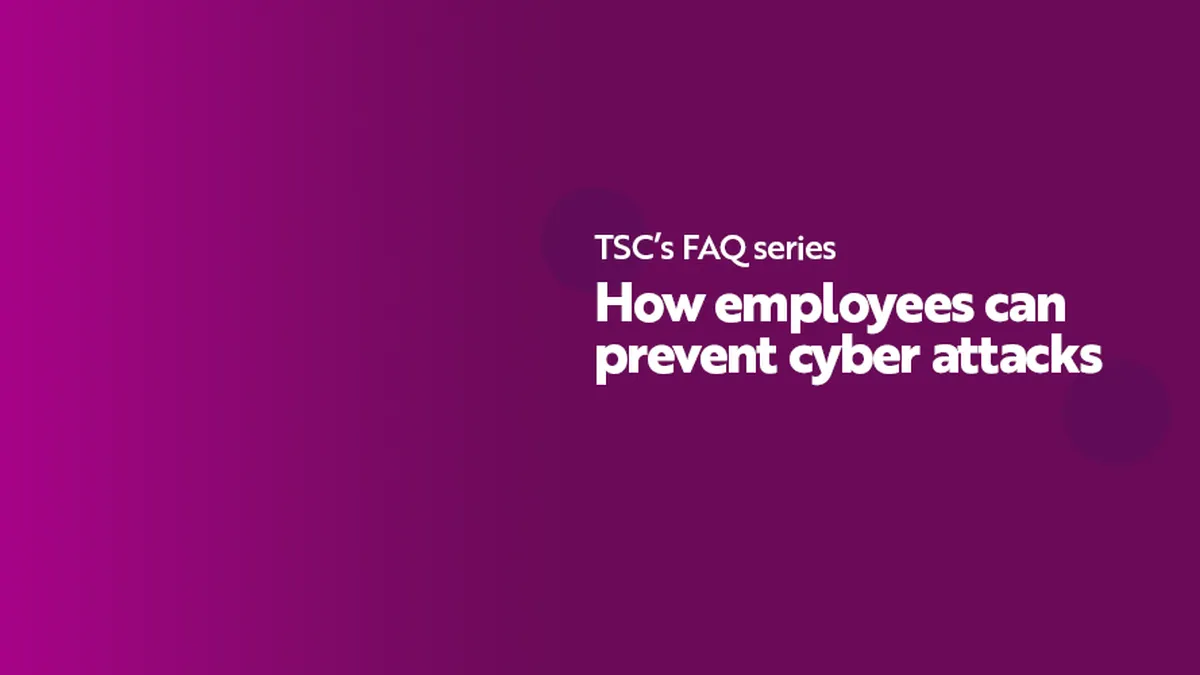
- Employee awareness
- 5 min read

While robust cyber security measures are crucial, employees play a vital role in preventing these attacks.
This article aims to provide a helpful guide on how employees can actively contribute to safeguarding their organisations against cyber threats.
By following best practices and adopting a security-conscious mindset, employees can effectively mitigate risks and protect sensitive information.
1. Strong passwords and authentication
One of the simplest yet most effective ways to prevent cyber attacks is by using strong passwords and implementing multi-factor authentication (MFA). Employees should be encouraged to create complex, unique passwords that include a combination of letters, numbers, and special characters (DOWNLOAD our FREE eBook on Password Security). MFA adds an extra layer of security by requiring an additional verification step, such as a fingerprint scan or a unique code sent to a mobile device.
By using strong passwords and MFA, employees can significantly reduce the risk of unauthorised access to their accounts.
2. Recognising and avoiding phishing attempts
Employees should receive training on how to identify and avoid phishing attempts. They should be cautious when opening emails or clicking on links from unknown or suspicious sources. Common red flags include grammatical errors, urgent requests for personal information, and suspicious attachments. Encouraging employees to verify the legitimacy of emails or contacting the sender through a trusted channel can help prevent falling victim to phishing attacks. Encourage the use of secure email encryption methods and provide guidelines on handling confidential data to minimise the risk of data breaches (DOWNLOAD our FREE eBook on Phishing).
3. Regular updates and patches
Outdated software and unpatched vulnerabilities are prime targets for cybercriminals. Employees should be aware of the importance of regularly updating their operating systems, applications, and antivirus software. These updates often contain critical security patches that address known vulnerabilities. Enforcing automated updates and educating employees about the risks of delaying or ignoring software updates can significantly reduce the organisation's exposure to potential cyber threats.
4. Safe internet and browsing practices
Employees should practice safe internet browsing habits, such as avoiding suspicious websites and refraining from clicking on pop-up advertisements. They should be cautious when downloading files and only do so from trusted sources.
5. IoT and mobile device security
With the rise of mobile technology, employees must understand the importance of securing their mobile devices. Implementing strong passcodes, enabling biometric authentication, and encrypting device storage are critical steps. Employees should also avoid connecting to unsecured public Wi-Fi networks, as they may pose significant security risks. Promoting the use of virtual private networks (VPNs) when accessing company resources remotely adds an extra layer of security.
6. Reporting suspicious activities
Employees should be encouraged to promptly report any suspicious activities or potential security breaches to the appropriate IT or security personnel. Implementing a clear reporting mechanism and fostering a culture of open communication can help identify and address potential threats before they escalate.
Employees play a crucial role in preventing cyber attacks by adopting proactive security measures. By creating strong passwords, recognising, and avoiding phishing attempts, staying updated with software patches, practicing safe internet and email habits, securing mobile devices, and reporting suspicious activities, employees can significantly strengthen an organisation's overall cybersecurity posture.
Through continuous education, training, and a security-conscious mindset, employees become an integral part of the defence against cyber threats, safeguarding sensitive information and ensuring the overall resilience of the organisation.
If you would like more information about how The Security Company can deliver engaging and effective cyber security training and awareness materials for organisations of all sizes or how we have helped transform security cultures for over 25 years ... please contact our Head of Business Development and Sales, Jenny Mandley.
The Security Company's vast library of customised and non-customised products and services are tailored for small, medium and large organisations and are available in a variety of languages. We also offer bespoke solutions for organisations that desire training and awareness materials built from the ground up.



© The Security Company (International) Limited 2023
Office One, 1 Coldbath Square, London, EC1R 5HL, UK
Company registration No: 3703393
VAT No: 385 8337 51


